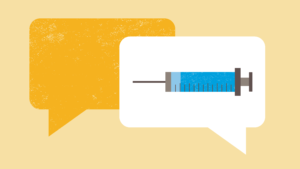Archive: Family Planning & Immunization Integration Toolkit
Archive:
Family Planning & Immunization Integration Toolkit
You have reached this page either from the main Toolkits Archive page or because you followed a link to a page or resource that used to be in a K4Health Toolkit. The Toolkits platform has been retired.

This toolkit, developed by the Family Planning and Immunization Integration Working Group, housed relevant resources developed by partner institutions. The objectives of the toolkit were:
- To provide a repository of information on integrated family planning and immunization service delivery.
- To make evidence-based information and tools accessible for health professionals and others around the world.
- To identify gaps in existing resources and provide new resources and tools as needed to fill gaps.
Toolkit Alternatives
- Explore articles related to FP/immunization integration published in Global Health: Science and Practice
- Explore The Challenge Initiative’s lesson on FP/immunization integration
- View/download the High Impact Practices brief on FP/immunization integration
- Visit past captures of the Family Planning and Immunization Integration Toolkit on the Internet Archive’s Wayback Machine
If you urgently require a specific resource from a retired Toolkit, contact toolkits-archive@knowledgesuccess.org.





